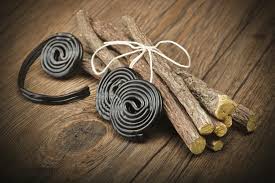
Does Liquorice Relieve Constipation
As we get older everything slows down. This includes our digestive system which frequently leads to constipation. Looking at solutions for constipation liquorice is often thought of. However, does liquorice relieve constipation?
What is liquorice?
The roots of the glycyrrhiza glabra plant where it comes from are sweetly flavoured. Containing over 300 different compounds studies show it may be effective in helping some conditions. Studies have indicated that liquorice may help with indigestion, hot flushes and low blood pressure. It is also thought to have anti-microbial properties.
In the UK the processed sweet known as liquorice has been processed having an aniseed flavour and contains added sugars. In this form, it’s sweet and should be eaten sparingly as it does contain calories.
Liquorice Tea
Taken in its more natural form as a root, tea or root extract tablet, liquorice contains fewer calories. However, the question of does liquorice relieves constipation is more about how it helps to aid digestion.
Supplements
There are various root extract supplements available which claim to aid digestion, treat inflammation and soothe sore throats.
Digestive Issues
It can help relieve acid reflux, heartburn, indigestion and upset stomachs however you need to ensure the type you are eating contains real root extract and not the processed Allsorts!
Relieving constipation
Drinking liquorice tea is thought to be one of the best ways to help relieve constipation. A glass of hot water in the mornings may help move things along. A lack of water is a common cause and older people are far less likely to drink the required 2l of water per day. Water aids digestion and helps move soluble fibre along the digestive passage. Olive oil also helps to soften foods making them pass more smoothly.
Prevention is better than cure.
Overall a good balanced diet full of fresh fruit and vegetables and plenty of water helps prevent constipation. Exercise is also important and this is where some might struggle. When you sit still for hours on end it makes the work of the colon harder. Try to encourage more movement and standing.
Evidence-based study
A 2011 study, published in Evidence-Based Complementary and Alternative Medicine, looked at people with indigestion taking 75mg liquorice root extract twice a day for 30 days.
After two weeks, patients said many of their symptoms had significantly improved, including upper abdominal fullness, bloating, regurgitation and loss of appetite.
Another 8-week study was conducted on 58 adults with gastroesophageal reflux disease (GERD), which has symptoms like heartburn and acid reflux.
The results showed that a low dose of glycyrrhetinic acid (from liquorice) in combination with normal treatment resulted in positive symptom improvements.
Chinese Medicine
In Chinese medicine, liquorice root is considered to have strong anti-inflammatory properties and is used to treat a variety of conditions from stomach ulcers to diabetes. It is used to soothe coughs and sore throats, control blood sugar, balance hormones, heal cold sores, and treat eczema, asthma, flu, herpes, and hepatitis. It is popularly used as a natural laxative, so it can help with constipation and aid digestive problems.
The active ingredient in liquorice is glycyrrhizin which is said to be far sweeter than sugar and causes water retention which can make constipation worse.
Don’t take too much
Over-consumption of liquorice however may cause high blood pressure, low potassium, and oedema (swelling caused by fluid retention).
Medical Advice
If someone elderly is frequently constipated or it is causing them to feel unwell seek medical advice. Either chat with a pharmacist or their GP. They are able to prescribe suitable medication and stool softeners. It is always best to check with the GP should you want to give off the shelf constipation remedies to ensure that they do not interact with other medication the person you care for is taking.
(Disclaimer: This is not a medical blog and I am not qualified to provide medical advice. Medical advice should be sought if an elderly person is regularly constipated especially if it affecting their well-being or appetite)

